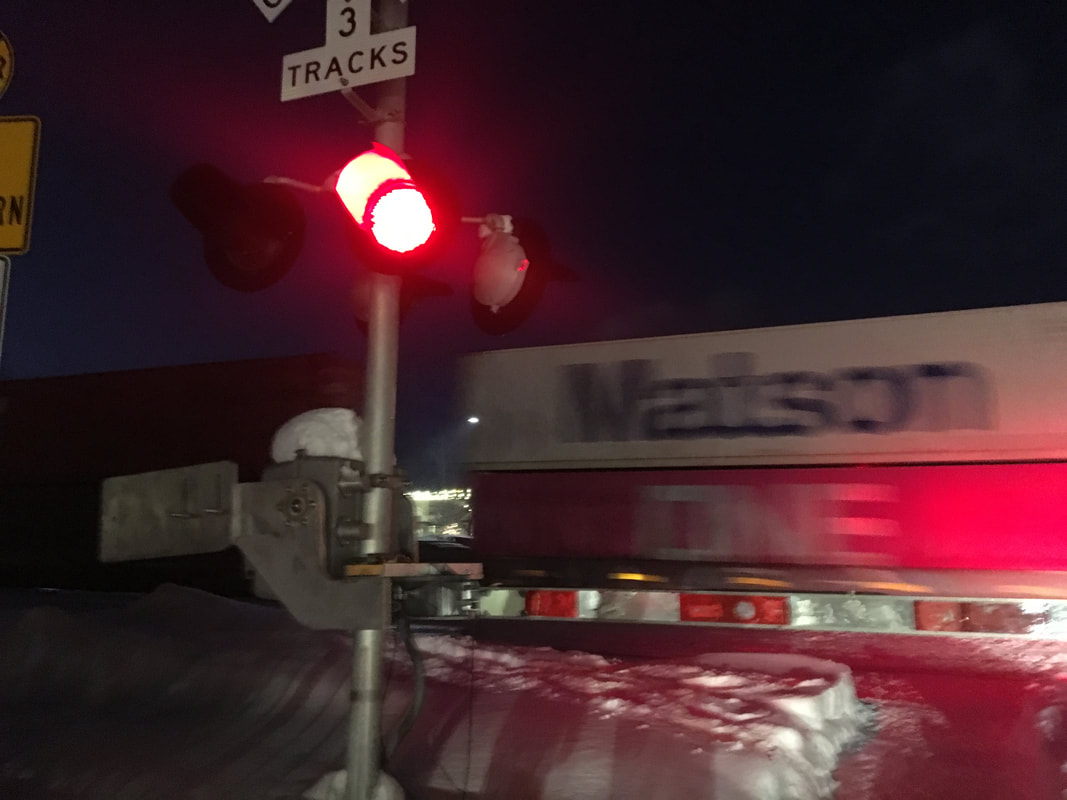|
What is it that eases my heart every time a train rumbles by? The predictability? The knowledge that when this one comes and goes, another will replace it? The sense of connection-by-track to the enduring cities of Los Angeles, Chicago, and other great metropolises of this nation? The understanding that through fire and snow, sickness and death, the engines move undeterred across our immense landscape? That nothing will stop it, except robbers looking for bags of money, and they are a thing of the past? That all the things that bring us to our knees right now will not bring the train to a halt? That the sound and vibration are surprisingly comforting, like being held and rocked inside an enormous tunnel by a fleshy, unapologetic body?
Often I wake up in the night, thinking the house is falling down, only to come to my senses and understand it’s a train. There is no feeling of panic. I have no sense of impending disaster. I reason with myself: the house is falling—again. No, it’s the train, the first engines dragging and the last ones pushing. In between, there’s only the steady heartbeat of wheels scouring the track. It comes into my dreams in the same sinuous way it takes a corner. The other night it carried me to the river, the Colorado, and left me on a high wooden platform that wasn’t stage or dam, but a scaffold of sorts over which people were dragging their boats. Looking down at the river below, we gasped. The river, the lifeblood of the Southwest, was only creek-wide. You could walk across it. You could throw a barstool across it. “Still,” said one man lugging a kayak, “it’s the right color and all.” I wanted to tell him the deep clear green wasn’t the right color, actually, just the color we’d all gotten used to. It was no dream the two summers I worked on a fire crew up in the Crown King district of the Prescott National Forest. They’d helicopter us in, we’d scrape line all night, then they’d tell us to walk out. We were seven short people, wore the same length jeans, and we’d hike out of there singing “Hi ho, hi ho.” Jean was the only other woman on the crew and she taught me how to get in a good nap when the fire died down and the air cooled off toward morning. Dig a trench, fill it with hot coals, throw dirt on top of that and lie down. Though I was just as likely to stay up with the boys, listening to their stories about life in the mountains. If we weren’t out in the burning woods, we’d gather in the Crown King saloon on a Saturday night and listen to the not-so-bad band singing Eagles songs and Crosby, Stills & Nash while the old-timers two-stepped. I was, for a brief time, a band member myself. Banged the tambourine. Which speaks nothing of the terror of working a fire—from ahead of it if you’ve got the maneuverability and the wind cooperates, otherwise anywhere you can lay down a line. Meals Ready to Eat and frozen canteens of water. For me the scariest thing was knowing I had a fire shelter in my pack, it looked like something you’d wrap a baked potato in before throwing it directly on the coals. That shelter frightened me more than anything else about that summer (except the 1979 Castle Fire that started in Crown King’s backyard). Knowing that I had on my person a tube of tinfoil whose purpose was to keep me alive as a fire ran over me—knowing I was supposed to keep from scorching my lungs by breathing with my face in the dirt while the fire raged around me—something in this allowed me no comfort, no peace of mind. It was, had I known then what I know now, the opposite of what the train offers, holding and rocking me inside its great fleshy heart.
1 Comment
|
AboutA place to discuss writing or anything on your mind. All visitors are invited to join the conversation by commenting on posts, asking questions, and joining the newsletter below for even more opportunities to connect and converse! Archives
April 2023
Categories |


 RSS Feed
RSS Feed